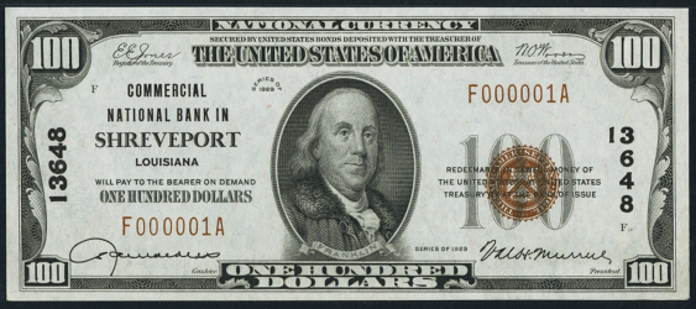One Hundred Dollar Notes › Nationals › 1929 One Hundred Dollar National Bank Notes › Kansas Charters › 1929 $100 Leoti Kansas First National Bank
Get Value Now
| Item | Info |
|---|---|
| Series | 1929 |
| Charter | #3844 First National Bank of Leoti, Kansas |
| Year Chartered | 1888, 122 Banks Chartered |
| City Info | Leoti, pronounced "Lee-OH-Tah." is a city in and the county seat of Wichita County, Kansas, United States. As of the 2010 census, the city population was 1,534. Leoti was founded in 1885 by a company of men from Garden City, Kansas. Two years later, in 1887, it was involved in the bloodiest county seat fight in the history of the American West. The shoot-out was on February 27, 1887, when men—some would say hired gunmen—from Leoti, went to the neighboring, rival town of Coronado and left several people dead and wounded. A small town called Farmer City which was located between Coronado and Leoti, was hoped by some to become the county seat—which would end the fighting. Leoti later won the right to become the county seat and now the two other towns consist mainly of farmland. Source: Wikipedia |
| Similar Cities | City name is unique, no others like it. |
| Seal Varieties | Small Brown |
| See Also | If your note doesn't match try: 1. 1929 $100 Federal Reserve Bank Note 2. 1928 $100 Federal Reserve Note 3. 1928A $100 Federal Reserve Note 4. 1934 $100 Federal Reserve Note 5. 1934A $100 Federal Reserve Note 6. 1934B $100 Federal Reserve Note |
| Other Info | 1. Value depends on notes known for charter, condition and market demand. |
| Neat Fact | Check your note's serial number. Serial #1 notes are valuable, even on common charters. Serial numbers 2-4 are also desirable in some cases. |
No Obligations Offers and Appraisals
Please submit a good photo or scan. It will be identified and evaluated. Understand there may be subtle differences between the image you see above and your note. Signatures, design, markings and note condition will determine the offer price. Notes in Uncirculated or better condition receive the best offers.
Appraisals can be estimated for wholesale and retail prices. Wholesale is what dealers typically pay. Retail is what a collector might pay. Retail is slightly higher in most cases.
Please visit this page for USA Paper Money Reference. Do not treat this page as a reference guide, it is for appraisal and acquisition purposes only.
